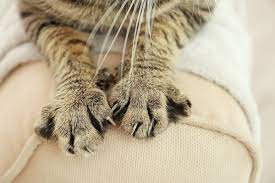
Hot pavement can indeed pose a significant risk to your cat's feet. Cats, like humans, are susceptible to burns and injuries from walking on hot surfaces. The sensitivity of their paw pads makes them particularly vulnerable to the scorching temperatures that pavement can reach during hot weather.
Pavement absorbs and retains heat from the sun, making it much hotter than the surrounding air. Even on moderately warm days, the temperature of pavement can rise to dangerous levels. Cats' paw pads are not designed to withstand extreme heat, as they lack the protective layers found on the soles of human feet.
When a cat walks on hot pavement, the intense heat can quickly transfer to their delicate paw pads, leading to burns and discomfort. This can cause pain, inflammation, and even blisters or open sores. In severe cases, deep tissue damage can occur, requiring medical attention.
It's important to remember that cats have limited means of dissipating heat from their bodies. Unlike humans, who can regulate their temperature through sweating, cats rely on panting and seeking out cooler areas. Walking on hot pavement can further hinder their ability to cool down, leading to heat stress or heatstroke.
To protect your cat's feet from hot pavement, there are several preventative measures you can take. First and foremost, try to avoid walking your cat during the hottest times of the day, typically between late morning and early evening. Instead, opt for early morning or late evening walks when temperatures are cooler.
Before venturing outside, test the pavement with the back of your hand or bare foot. If it feels hot, it's likely too hot for your cat's paws. Consider walking your cat on grass or shaded areas instead. Alternatively, you can use booties specifically designed for cats to provide a protective barrier between their paws and the pavement.
Regularly check your cat's paw pads for any signs of injury or discomfort. If you notice redness, swelling, blisters, or if your cat is limping, it's crucial to seek veterinary care promptly. They can provide appropriate treatment and guidance to facilitate the healing process.
In conclusion, hot pavement can indeed hurt your cat's feet. Their sensitive paw pads are susceptible to burns and injuries from walking on scorching surfaces. Taking preventive measures, such as avoiding hot pavement during the hottest times of the day and using protective booties, can help keep your cat's feet safe and comfortable. Remember to prioritize your cat's well-being by paying attention to signs of injury and seeking veterinary care if necessary.
